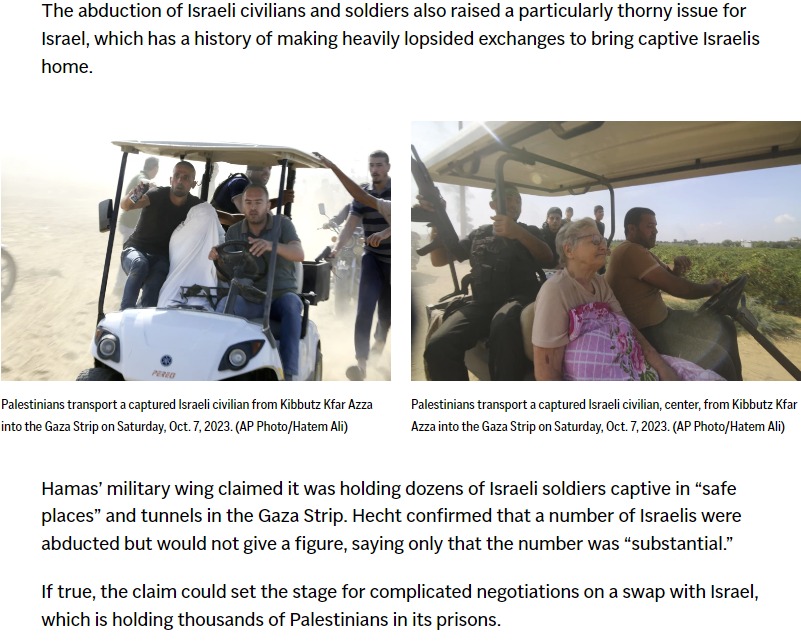And if go beyond "grand strategy" and you're also willing to believe their tactical claims, according to Al-Jazeera:
A senior Hamas leader has said that the group had captured enough Israeli soldiers during an unprecedented attack against Israel to make Israeli authorities free all Palestinian prisoners in its jails.
This, I might add, is no different from how analysts framed the 2008 escalation, in terms of additional/secondary goals:
Hamas hoped to achieve an
“image of victory” by carrying out acts with more than
military significance, such as kidnapping IDF soldiers,
destroying tanks, or downing airplanes and helicopters [...]
Back to 2023:

BTW, regarding prisoner swaps, the strategy did bear fruit for Hamas in the past, with Israel releasing significant number of Palestinians, as well as leading figures, in exchange for a much smaller number of Israelis, as this piece from last year related:
Two of Israel’s main goals in engaging with Hamas are recovering the bodies of two soldiers from the 2014 war and negotiating the release of two civilians captured during last year’s conflict. In return, Hamas wants Israel to free multiple prisoners, similar to the 2011 swap in which Egypt brokered the release of 1,027 jailed Palestinians in exchange for the Israeli soldier Gilad Shalit (the mechanics of that swap were coordinated by German intelligence officials). Among those released were high-profile Hamas figures such as Yahya al-Sinwar, who has served as the organization’s leader in Gaza since 2017.
I'm not sure if this is a change in Hamas procedures per se, or just success at a greater scale, but reportedly they managed to capture a substantial number of Israeli civilians this time:

According to one Hamas claim the number was [at least] 53, in this "Al Aqsa Flood".
There's probably also the competition factor between Hamas and PIJ (Palestinian Islamic Jihad), which unlike Hamas has maintained a more sustained cycle of attacks with more direct Iranian support, according to some observers, such as an Egyptian ambassador. That's also not exactly new (as this 2007 piece put it):
Losing the battle of the ‘media Jihad’ to the smaller, less popular Islamic Jihad is therefore a tragic failure in the eyes of the Hamas communication committee. In the October meeting of Hamas propagandists, Fathi Hamad lamented Islamic Jihad’s ability to project itself as an equal to Hamas despite being smaller, lacking a developed social welfare wing and commanding less support on the street.
FWTW:
While 13.5 percent of Gaza’s population preferred PIJ in April 2014, 30.8 percent of the same population supported the movement in September 2014 after Israel’s “Protective Edge” bombing campaign. This places PIJ in a similar position to that of Hamas in the mid-1990s, during which period Hamas’s political violence earned it political support and undermined Fatah as disillusionment with the peace process grew.
Also both groups appear to launch their rockets in what one might call saturation attacks lately, in response to improved efficiency of Israeli defense anti-air, as that Egyptian ambassador relates:
The Iron Dome had an 86% interception rate in 2012, 89% in 2014, 94% in 2021, and 97% in the last operation. However, Israel did not expect these armed groups — who have been under siege in Gaza since 2007 — to launch more than 4,369 rockets in 11 days in May 2021, or 1,100 by PIJ in fewer than a mere three days. The range of rockets increased from two to three kilometers in 2001 to 160 kilometers in 2014. Ineffective as these rockets are, they still terrorize Israeli communities and resulted in Israel closing Ben Gurion Airport in May 2021 and diverting flights in 2022.
That approach also probably has a bigger media impact than the trickle of rockets from before.
Regarding the Saudi angle (which is working by the way--they have already called for Israel to "exercise restraint" in their retaliatory strikes) one of the more subtle points is that in August the Saudis have offered the Palestinian Authority (Abbas) funds in exchange for normalizing relations with Israel. So Hamas wasn't just worried about the Saudi's own relations with Israel improving, but them encouraging Palestinians to do the same with financial incentives. More explicitly, the Saudis apparently offered funds in return for Abbas exercising stricter control over the groups that attacked Israelis from the West Bank.
BTW, the Saudi call for restraint is quite in contrast with Israeli statements on this; Netanyahu reportedly professed "mighty vengeance" and an Israeli army spokesman said Hamas cannot be allowed to continue to govern Gaza or even "live" after this attack. In contrast, Hamas' leader, expressed his belief/hope that the "morning of defeat and humiliation" inflicted on Israeli forces and settlers will cause all Palestinians (incl. those in the West Bank) to take up arms against Israel.
One of the Hamas (nominally former) leaders was interviewed on Saudi TV, where he makes comparisons with the Soviet losses in WW2, Vietnamese and even Afghan losses against both the USSR and USA.
He also says that Egypt has not been doing enough. So, reading a bit between the lines, causing Irsael to retaliate in a way that would produce a large number of Palestinian casualties was meant to inflame/revive support in the neighboring countries, ideally (from Hamas' perspective) drawing them into another war with Israel.

